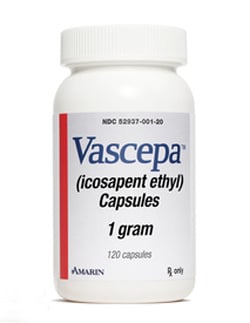 Many of the Big Pharma players have paid hundreds of millions, sometimes billions, of dollars to settle federal litigation accusing them of pushing their products for unapproved uses. Now tiny Amarin ($AMRN) has won the FDA's blessing to do just that if it will drop its free speech lawsuit against the agency, providing the opening U.S. pharma has been looking for to market drugs for uses other than those for which they are approved.
Many of the Big Pharma players have paid hundreds of millions, sometimes billions, of dollars to settle federal litigation accusing them of pushing their products for unapproved uses. Now tiny Amarin ($AMRN) has won the FDA's blessing to do just that if it will drop its free speech lawsuit against the agency, providing the opening U.S. pharma has been looking for to market drugs for uses other than those for which they are approved.
Dublin-based Amarin said in a statement late Tuesday that the FDA agreed not to appeal an August federal court ruling that said Amarin had a free speech right to tell doctors about studies supporting the use of the fish-oil derived cardio drug Vascepa for uses not approved by the FDA as long as they are truthful. It sets up an "optional" procedure for Amarin to submit marketing materials to the FDA for approval twice a year if it wants to get preclearance of marketing materials. The ruling must still be approved by a federal judge.
For its part, the FDA downplayed the significance of the settlement. "It is important to note that this settlement is specific to this particular case and situation, and does not signify a position on the First Amendment and commercial speech," the agency said in a statement, Reuters reports.
Experts expect the FDA to be more flexible to avoid more cases like the one Amarin filed but some also will be counseling clients to take it slow and be very certain of the clinical data they intend to use to discuss unapproved uses of their products.
 |
| David Rosen |
David Rosen, who spent 14 years with the FDA and is now an attorney with Foley & Lardner in Washington, DC, told FiercePharma today that he expects companies will start pushing in this. But he said he will advise them to be "very cautious in engaging in off-label promotion," because what constitutes truthful and not misleading remains a very gray area. "It is still not expressly clear where the line is," Rosen said.
Further, he said companies should not interpret this to mean the FDA is giving pharma a big opening for off-label promotions. "If companies go too far out on a limb, we will see more regulation on this," Rosen said. "It depends on their risk tolerance."
For Amarin, it was somewhat of a do or die situation. It has only the one approved product and has struggled to get traction for Vascepa, which is approved only for patients who suffer from a condition that leaves them with extremely high triglyceride levels. That indication is much narrower than Amarin had hoped for given that trials showed the drug did in fact lower high blood lipids it targets, something doctors believe can be generally beneficial. But the FDA pointed out that its data did not precisely show the drug actually prevented coronary artery disease and warned the drugmaker it would consider any effort it made to promote the drug for the wider use as misbranding.
Amarin responded by suing the agency, arguing its First Amendment rights would be trampled by the federal agency if it were not able to discuss such findings. The federal court sided with Amarin, approving an injunction that kept the FDA from taking action.
Already another drugmaker, Pacira, has followed suit, asking a federal court to grant it similar permission on the way it markets its pain drug Exparel. The FDA in 2014 sent the New Jersey company a warning letter for promoting Exparel for pain relief in surgeries not listed on its label. The company says its label is approved for general uses and not limited to specific surgeries and it should be able to point that out to doctors.
- here's the Amarin announcement
- here's the settlement (PDF)
- read the New York Times story
- more from Reuters